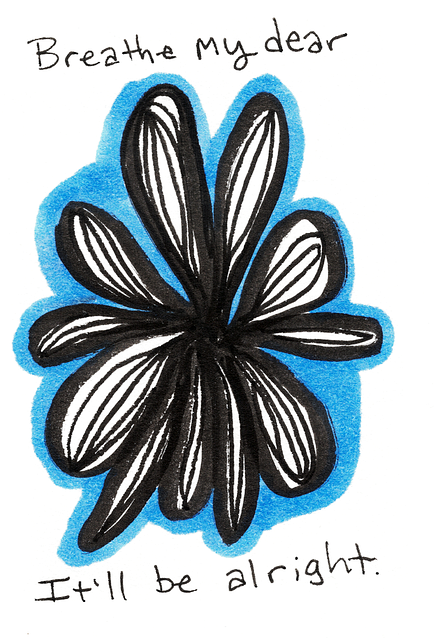Mindfulness meditation emerges as a powerful tool within Aurora Cancer Issues Therapy, offering cancer patients a means to manage stress, anxiety, and negative thought cycles. By creating a dedicated space with soothing elements, individuals can incorporate mindfulness practices, such as journaling, to enhance emotional well-being and resilience. Starting with basic techniques and exploring guided meditations tailored for cancer patients, mindfulness provides a holistic approach to coping with treatment symptoms. Post-therapy, integrating mindfulness into daily routines cultivates present-moment awareness and promotes mental wellness for long-term recovery.
Mindfulness meditation has emerged as a powerful tool for cancer patients, offering a way to navigate the challenges of diagnosis and treatment. This practice enables individuals to cultivate inner peace and enhance their overall well-being during their journey.
In this guide, we explore the benefits of mindfulness specifically tailored to Aurora Cancer Issues, providing practical steps to integrate meditation into daily life post-therapy. From setting up a calming space to various techniques, discover how to embrace a mindful approach to healing.
- Understanding Mindfulness Meditation for Cancer Patients
- Setting Up Your Aurora: Creating a Meditative Space
- Techniques and Exercises to Navigate Your Journey
- Integrating Mindfulness into Daily Life After Therapy
Understanding Mindfulness Meditation for Cancer Patients

Mindfulness meditation has emerged as a powerful tool for cancer patients navigating the challenging journey of Aurora Cancer Issues Therapy. It goes beyond simply relaxing the mind; it’s an active practice that fosters awareness and acceptance, two key components in managing stress and anxiety associated with the disease. By focusing on the present moment, mindfulness helps individuals detach from negative thoughts and worries about the future or regrets from the past, offering a respite from the constant mental chatter often experienced during cancer treatment.
This ancient technique encourages patients to observe their emotions and physical sensations without judgment, promoting self-compassion and a deeper understanding of their bodies. As an effective Stress Reduction Method, mindfulness meditation complements traditional Trauma Support Services, providing a means to cope with the emotional turmoil that often accompanies a cancer diagnosis. Moreover, it enhances Communication Strategies by teaching patients to listen more attentively to both their inner selves and those around them, fostering stronger connections during this trying period.
Setting Up Your Aurora: Creating a Meditative Space

Creating a dedicated space for mindfulness meditation is the first step in harnessing its therapeutic benefits, especially for those dealing with Aurora cancer issues. Your meditative sanctuary, much like an aurora—a captivating celestial display—can be a vibrant and calming environment that supports your journey towards emotional well-being. Consider transforming a quiet corner of your home into a serene haven where you can escape the chaos of daily life. A simple yet effective setup involves a comfortable cushion or chair, soft lighting (candles or dimmable lamps), and perhaps some soothing decor like plants or artwork that inspires peace.
In the context of risk management planning for mental health professionals, this dedicated space becomes a tool to promote mental wellness. Incorporate practices like journaling as an emotional well-being promotion technique alongside your meditation. A journal can be your companion, allowing you to reflect on thoughts and emotions that arise during practice. This self-care routine, combined with regular mindfulness sessions, ensures a holistic approach to managing stress and fostering resilience—a crucial aspect of cancer therapy and overall mental wellness.
Techniques and Exercises to Navigate Your Journey

Embarking on your mindfulness meditation journey involves a range of techniques and exercises designed to help you navigate stress, anxiety, and even complex issues like Aurora cancer therapy and its associated challenges. Start with simple breathing exercises, focusing on slow, deep inhales and exhales, to anchor yourself in the present moment. Progressive muscle relaxation is another powerful tool; by tensing and releasing different muscle groups, you can foster emotional intelligence and learn to recognize physical signs of stress.
As your practice grows, explore guided meditations tailored for cancer patients, which often incorporate calming imagery and affirmations. These sessions can help manage symptoms related to treatment and enhance overall well-being. Remember, mindfulness is a personal journey; be patient with yourself, and don’t hesitate to adapt techniques to suit your unique needs, especially when dealing with mental illness stigma reduction efforts or public awareness campaigns development, which can greatly benefit from the emotional resilience fostered by regular meditation practice.
Integrating Mindfulness into Daily Life After Therapy

After completing therapy for cancer, many individuals seek ways to integrate mindfulness into their daily lives as a form of self-care practice. Mindfulness meditation can be a powerful tool in this transition. It allows individuals to cultivate present-moment awareness and develop a deeper connection with their thoughts and feelings without judgment. This process is particularly beneficial for those who have faced the challenges of Aurora cancer issues, helping them navigate any lingering stress or anxiety.
Incorporating mindfulness into daily routines can range from short, focused meditation sessions to more extended practices like mindful walking or eating. Encouraging positive thinking and a sense of calm, these self-care practices enable individuals to maintain their mental well-being and resilience. By consistently dedicating time for mindfulness meditation, former cancer patients can enhance their overall quality of life and foster a stronger sense of balance and tranquility.
Mindfulness meditation offers cancer patients a powerful tool to navigate their journey, fostering resilience and enhancing overall well-being. By creating a peaceful ‘aurora’ through dedicated practice spaces and techniques, individuals can integrate mindfulness into daily life post-therapy, promoting long-term mental health and serving as a beacon of calm amidst Aurora Cancer Issues. This holistic approach not only aids in recovery but also equips individuals with the strength to face future challenges head-on.














